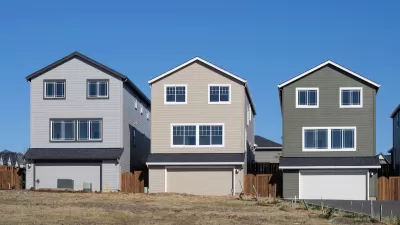Planning is only one ingredient of the cocktail that produces new housing, but planning should bear in mind all the other factors influencing the process. Vancouver and Seattle provide case studies and sharp contrasts in housing outcomes.

"When it comes to condominium development, Cascadia’s two largest cities couldn’t be more different," according to an article by Margaret Morales.
"Last year nearly 60 percent of new housing starts in the city of Vancouver, BC [pdf], were condominiums; meanwhile, Seattle saw no new condominium buildings open. And that’s not changing anytime soon: less than 10 percent of all building slated for downtown Seattle in the next three years will be condos," explains Morales.
The question posed by the article is why the cities are building such drastically different additions to their housing stock.
The short answer is economics. In Vancouver, apartments are saddled with an unfavorable tax code, making condos the more lucrative multi-family housing investment even despite high rental demand. In Seattle’s skyrocketing rental market, one that’s climbed even faster than the condo market in recent years, apartment buildings are much more financially attractive, while condos come with bigger risks and, typically, lower returns.
Morales doesn't stop with the short answer, by any means, going into much more detail to examine the differences between the two cities. Thus the article serves as an in-depth examination of the cocktail of variables that influence the housing that comes out on the other side of regulatory schemes and market dynamics.
FULL STORY: WHY SEATTLE BUILDS APARTMENTS, BUT VANCOUVER, BC, BUILDS CONDOS

Alabama: Trump Terminates Settlements for Black Communities Harmed By Raw Sewage
Trump deemed the landmark civil rights agreement “illegal DEI and environmental justice policy.”

Planetizen Federal Action Tracker
A weekly monitor of how Trump’s orders and actions are impacting planners and planning in America.

The 120 Year Old Tiny Home Villages That Sheltered San Francisco’s Earthquake Refugees
More than a century ago, San Francisco mobilized to house thousands of residents displaced by the 1906 earthquake. Could their strategy offer a model for the present?

Ken Jennings Launches Transit Web Series
The Jeopardy champ wants you to ride public transit.

BLM To Rescind Public Lands Rule
The change will downgrade conservation, once again putting federal land at risk for mining and other extractive uses.

Indy Neighborhood Group Builds Temporary Multi-Use Path
Community members, aided in part by funding from the city, repurposed a vehicle lane to create a protected bike and pedestrian path for the summer season.
Urban Design for Planners 1: Software Tools
This six-course series explores essential urban design concepts using open source software and equips planners with the tools they need to participate fully in the urban design process.
Planning for Universal Design
Learn the tools for implementing Universal Design in planning regulations.
Clanton & Associates, Inc.
Jessamine County Fiscal Court
Institute for Housing and Urban Development Studies (IHS)
City of Grandview
Harvard GSD Executive Education
Toledo-Lucas County Plan Commissions
Salt Lake City
NYU Wagner Graduate School of Public Service





























